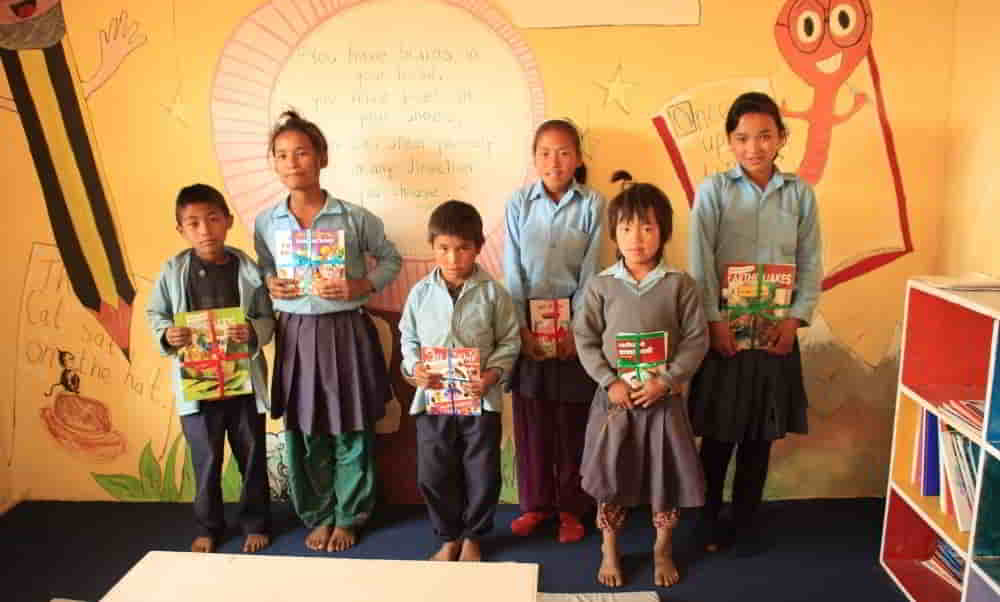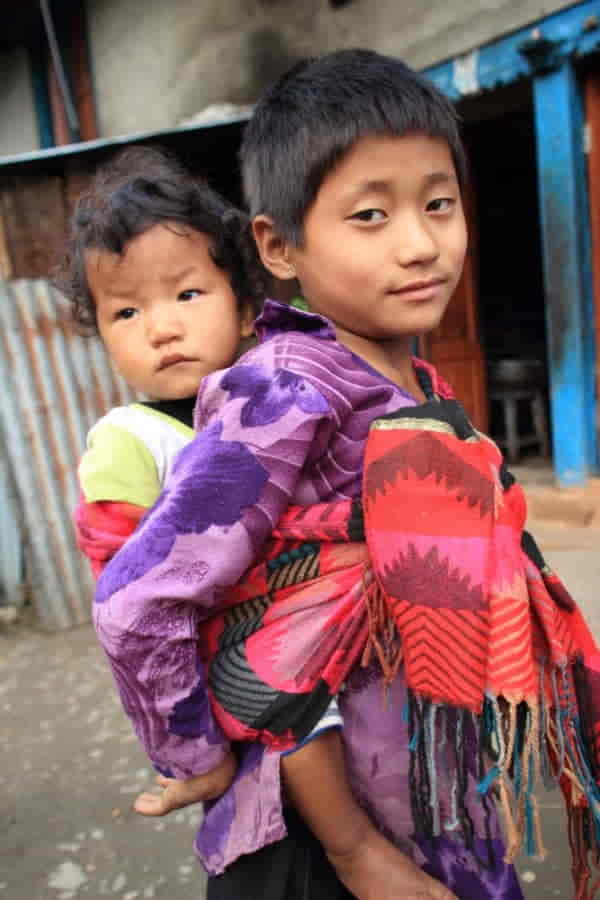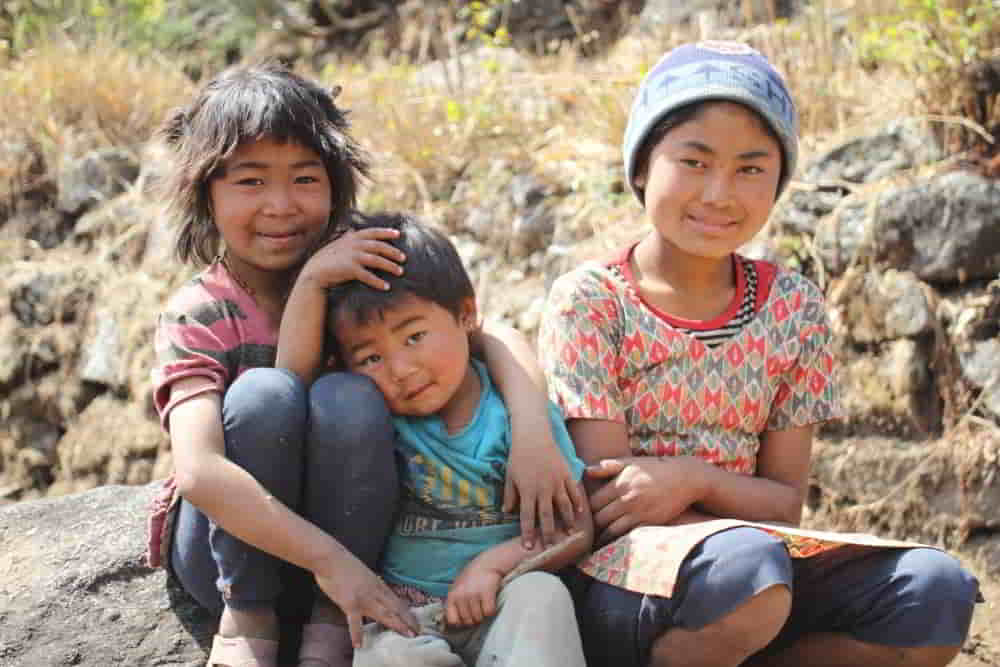
Having only recently discovered the joys of reading, Muskaan would have just begun losing herself into the fantastic worlds books bring alive! She would have just begun dreaming of possibilities, of worlds beyond her reach and begun entertaining ideas that had probably never entered her young mind. In a world where TVs and videos are rare, books would have provided an outlet for the curious mind that she must have been.
I know because that’s exactly what happened to me when I discovered my love of books, which was also at about the same stage in my academic career — as a primary student in grade 5! (Books also provided me with the escape I needed when I was jailed in Qatar.)
What would she have dreamt about? We will never know because the young child is no longer in school. She is in Delhi, working as a nanny for a well-acquainted family also from the district…so the mother tells me.
Apparently Muskaan gets private language lessons in the mornings and evenings and the rest of the day babysits a two-year-old toddler. She doesn’t get paid at all; private Hindi language lessons counting as compensation…for the time being.
Muskaan, apparently, wanted to do this because, as the first-born, she wanted to give her three younger siblings better opportunities.
It was on our February visit to Thangpalkot that I first heard about Muskaan, and on our March visit that I went to see, and spoke to, the mother and learned the rest of the heart-breaking story.
By then, Muskaan had already been in India for a month and a half. The mother assured me that the child is not alone. Two other children of about her age, also from Gunsa neighborhood, have similar arrangements in neighboring houses — one of them a distant cousin.
But according to those who know about these “arrangements,” work-placement elsewhere follows sufficient mastery of Hindi.
Also in March, I paid a visit to another child, who had stopped coming to Raithane School, to see if I could do anything to convince her to return to school instead of following in Muskaan’s footsteps.
Sona, supposedly twelve, looked much younger! When I reached her home, she was helping her 65-year-old paternal grandmother, the sole guardian of the three minors, sow some corn in the small patch of field they owned. Apart from that patch and a house, the family had very little else.
According to the grandmother, Sona, just like Muskaan, wants to go to Delhi to work to offer better opportunities for her sister and brother. Since her son’s death from drowning the previous year and the daughter-in-law abandoning the children to her, the grandmother has had no support raising them. The grandmother believes Sona’s mother sends money from Lebanon, where she works, to her own parents who are looking after Sona’s fourth sibling, also younger than her.
I did my best to assure Sona that if she wanted to stay in the village I would make sure both her and her sister’s educational expenses would be met. I did my best to try to find out if indeed what her grandmother was saying about her desires were hers.
She did not utter a single word to me, however! I wasn’t sure if going to Delhi was her own desire, but if it were and it may well be, as frustrated as I was inside, I was not surprised by her silence!
When I had decided that I would get my family out of our socio-economic condition through education, afraid that I would be ridiculed and laughed at, I rarely shared that dream with people who I felt wouldn’t understand me.
Not much long after being dropped off in Pokhara by my grandfather, I had begun to learn about the responsibilities of being the first-born. By then, I already had two younger brothers. By the time I was about Sona’s age, when I first dreamt of going abroad, my parents had added two more brothers! Even as a child myself, I had grown up being responsible for them — baby sitting them when I would be home.

As the first-born, the pressure to move out of school and into the “job” market to supplement my family’s income and offer a better lifestyle, and better educational opportunities for my younger siblings, had always been there. I had refused to capitulate convinced that education would provide — though it would take longer — considerably more reliable and long-term financial security to both myself and my family.
I also knew that if I had any conversation or debate with my parents about staying in school vs. working, I would lose. So I never did — I avoided it completely!
As insane as this sounds, I felt guilty however, because, to the young mind shaped by Nepalese culture, I was being “selfish.” To assuage the guilt, I would forego trips with friends, trips which incurred expenses, such as picnics, cycling tours etc. One particular picnic my classmates have talked about over the years cost all of Rs. 50 (probably about US$5.00 at the time), but five times my daily lunch allowance of Rs. 10! It was for the same reason that I didn’t spend a single dollar of the US$150 I took along to Italy in 1988; I brought it right back home and gave it to my dad!
While I may have had some of my innocence stolen by the circumstances of my birth, I am one of the very very lucky ones in Nepal to have been able to live his dreams. Muskaan, Sona, and hundreds of thousands of children from similar socioeconomic backgrounds, aren’t so lucky: they fall victim to trafficking.
While for a long time, the destinations were Indian cities, of late, they have expanded to include Nepalese cities, like Kathmandu — to populate “orphanages” among others — and far off countries such as Malaysia, and far off regions such as the Gulf and countries in the African continent, according to articles I have read since returning to Nepal.
Trafficking of children, as most who know anything about it is aware and has already been alluded to, is mainly due to poverty and lack of education — responsibilities of the government. Corruption at the highest levels of the successive “democratic” governments since 1990, have robbed these children of some of their most basic needs and rights — food, shelter and education!
When budgets for such social programs meant to uplift families, such as those of Muskaan and Sona, don’t reach and benefit them, young children like them take on the responsibilities of providing for their younger siblings and families by entering the “job market,” forsaking their own dreams! Most of those funds are gobbled up — as “commission” — by different officials at different stages of transference.
So, sadly, we have poor young children in Nepal who display a stronger sense of responsibility towards those they feel responsible for than our mostly elderly leaders!
By failing to provide for the most basic needs of such children and their families, by failing to fulfill their responsibilities towards the vulnerable citizens of the country, and thereby, in a way, by enabling their trafficking, the corrupt and morally bankrupt leadership of the country steal the innocence and squash the dreams of poor and marginalised children, such as Muskaan and Sona.
We at COMMITTED are doing what little we can — providing educational opportunities to the children of the small village of Thangpalkot in Sindhupalchok district through sponsorship and support of their schools by other means — so that some of those children may break out of the circumstances they find themselves in, just as I did.
That’s the hope anyway!

